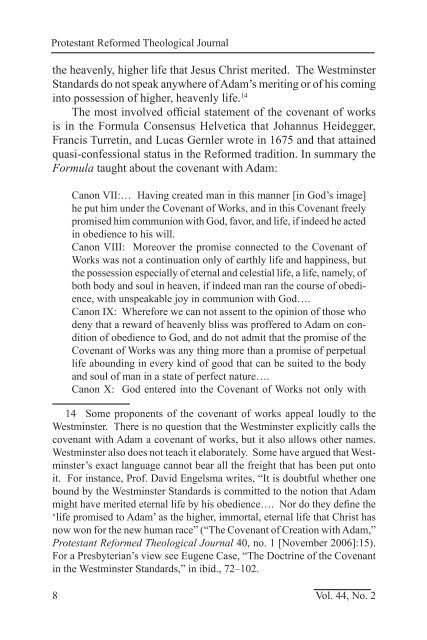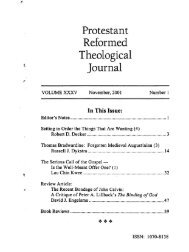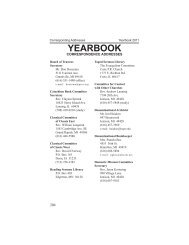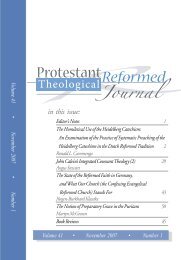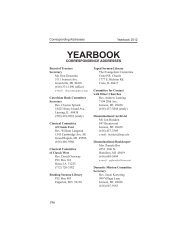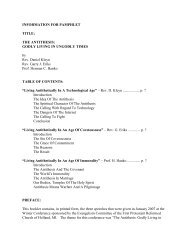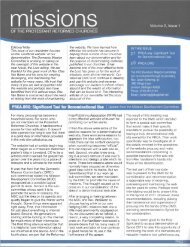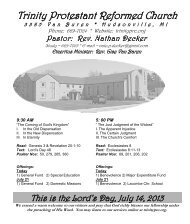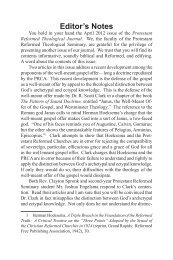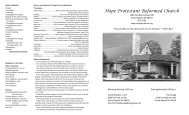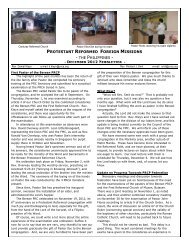A Critique of the Covenant of Works in Contemporary Controversy
A Critique of the Covenant of Works in Contemporary Controversy
A Critique of the Covenant of Works in Contemporary Controversy
You also want an ePaper? Increase the reach of your titles
YUMPU automatically turns print PDFs into web optimized ePapers that Google loves.
Protestant Reformed Theological Journal<br />
<strong>the</strong> heavenly, higher life that Jesus Christ merited. The Westm<strong>in</strong>ster<br />
Standards do not speak anywhere <strong>of</strong> Adam’s merit<strong>in</strong>g or <strong>of</strong> his com<strong>in</strong>g<br />
<strong>in</strong>to possession <strong>of</strong> higher, heavenly life. 14<br />
The most <strong>in</strong>volved <strong>of</strong>ficial statement <strong>of</strong> <strong>the</strong> covenant <strong>of</strong> works<br />
is <strong>in</strong> <strong>the</strong> Formula Consensus Helvetica that Johannus Heidegger,<br />
Francis Turret<strong>in</strong>, and Lucas Gernler wrote <strong>in</strong> 1675 and that atta<strong>in</strong>ed<br />
quasi-confessional status <strong>in</strong> <strong>the</strong> Reformed tradition. In summary <strong>the</strong><br />
Formula taught about <strong>the</strong> covenant with Adam:<br />
Canon VII:… Hav<strong>in</strong>g created man <strong>in</strong> this manner [<strong>in</strong> God’s image]<br />
he put him under <strong>the</strong> <strong>Covenant</strong> <strong>of</strong> <strong>Works</strong>, and <strong>in</strong> this <strong>Covenant</strong> freely<br />
promised him communion with God, favor, and life, if <strong>in</strong>deed he acted<br />
<strong>in</strong> obedience to his will.<br />
Canon VIII: Moreover <strong>the</strong> promise connected to <strong>the</strong> <strong>Covenant</strong> <strong>of</strong><br />
<strong>Works</strong> was not a cont<strong>in</strong>uation only <strong>of</strong> earthly life and happ<strong>in</strong>ess, but<br />
<strong>the</strong> possession especially <strong>of</strong> eternal and celestial life, a life, namely, <strong>of</strong><br />
both body and soul <strong>in</strong> heaven, if <strong>in</strong>deed man ran <strong>the</strong> course <strong>of</strong> obedience,<br />
with unspeakable joy <strong>in</strong> communion with God….<br />
Canon IX: Wherefore we can not assent to <strong>the</strong> op<strong>in</strong>ion <strong>of</strong> those who<br />
deny that a reward <strong>of</strong> heavenly bliss was pr<strong>of</strong>fered to Adam on condition<br />
<strong>of</strong> obedience to God, and do not admit that <strong>the</strong> promise <strong>of</strong> <strong>the</strong><br />
<strong>Covenant</strong> <strong>of</strong> <strong>Works</strong> was any th<strong>in</strong>g more than a promise <strong>of</strong> perpetual<br />
life abound<strong>in</strong>g <strong>in</strong> every k<strong>in</strong>d <strong>of</strong> good that can be suited to <strong>the</strong> body<br />
and soul <strong>of</strong> man <strong>in</strong> a state <strong>of</strong> perfect nature….<br />
Canon X: God entered <strong>in</strong>to <strong>the</strong> <strong>Covenant</strong> <strong>of</strong> <strong>Works</strong> not only with<br />
14 Some proponents <strong>of</strong> <strong>the</strong> covenant <strong>of</strong> works appeal loudly to <strong>the</strong><br />
Westm<strong>in</strong>ster. There is no question that <strong>the</strong> Westm<strong>in</strong>ster explicitly calls <strong>the</strong><br />
covenant with Adam a covenant <strong>of</strong> works, but it also allows o<strong>the</strong>r names.<br />
Westm<strong>in</strong>ster also does not teach it elaborately. Some have argued that Westm<strong>in</strong>ster’s<br />
exact language cannot bear all <strong>the</strong> freight that has been put onto<br />
it. For <strong>in</strong>stance, Pr<strong>of</strong>. David Engelsma writes, “It is doubtful whe<strong>the</strong>r one<br />
bound by <strong>the</strong> Westm<strong>in</strong>ster Standards is committed to <strong>the</strong> notion that Adam<br />
might have merited eternal life by his obedience…. Nor do <strong>the</strong>y def<strong>in</strong>e <strong>the</strong><br />
‘life promised to Adam’ as <strong>the</strong> higher, immortal, eternal life that Christ has<br />
now won for <strong>the</strong> new human race” (“The <strong>Covenant</strong> <strong>of</strong> Creation with Adam,”<br />
Protestant Reformed Theological Journal 40, no. 1 [November 2006]:15).<br />
For a Presbyterian’s view see Eugene Case, “The Doctr<strong>in</strong>e <strong>of</strong> <strong>the</strong> <strong>Covenant</strong><br />
<strong>in</strong> <strong>the</strong> Westm<strong>in</strong>ster Standards,” <strong>in</strong> ibid., 72–102.<br />
8<br />
Vol. 44, No. 2


